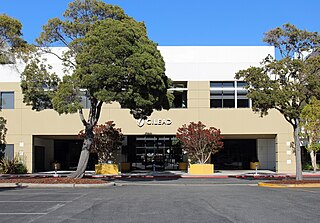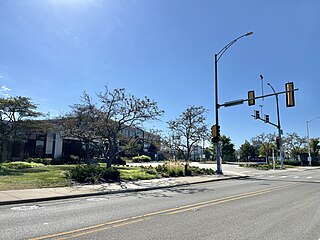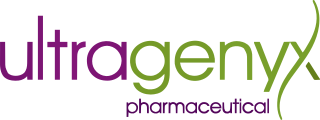
Pfizer Inc. is an American multinational pharmaceutical and biotechnology corporation headquartered at The Spiral in Manhattan, New York City. The company was established in 1849, in New York by two German entrepreneurs, Charles Pfizer (1824–1906) and his cousin Charles F. Erhart (1821–1891).

The Takeda Pharmaceutical Company Limited is a Japanese multinational pharmaceutical company. It is the third largest pharmaceutical company in Asia, behind Sinopharm and Shanghai Pharmaceuticals, and one of the top 20 largest pharmaceutical companies in the world by revenue. The company has over 49,578 employees worldwide and achieved US$19.299 billion in revenue during the 2018 fiscal year. The company is focused on oncology, rare diseases, neuroscience, gastroenterology, plasma-derived therapies and vaccines. Its headquarters is located in Chuo-ku, Osaka, and it has an office in Nihonbashi, Chuo, Tokyo. In January 2012, Fortune Magazine ranked the Takeda Oncology Company as one of the 100 best companies to work for in the United States. As of 2015, Christophe Weber was appointed as the CEO and president of Takeda.

AstraZeneca plc (AZ) is a British-Swedish multinational pharmaceutical and biotechnology company with its headquarters at the Cambridge Biomedical Campus in Cambridge, United Kingdom. It has a portfolio of products for major diseases in areas including oncology, cardiovascular, gastrointestinal, infection, neuroscience, respiratory, and inflammation.
Sanofi S.A. is a French multinational pharmaceutical and healthcare company headquartered in Paris, France. The corporation was established in 1973 and merged with Synthélabo in 1999 to form Sanofi-Synthélabo. In 2004, Sanofi-Synthélabo merged with Aventis and renamed to Sanofi-Aventis, which were each the product of several previous mergers. It changed its name back to Sanofi in May 2011. The company is a component of the Euro Stoxx 50 stock market index. In 2023, the company’s seat in Forbes Global 2000 was 89.

Amgen Inc. is an American multinational biopharmaceutical company headquartered in Thousand Oaks, California. As one of the world's largest independent biotechnology companies, Amgen has approximately 24,000 staff in total as of 2022.

Gilead Sciences, Inc. is an American biopharmaceutical company headquartered in Foster City, California, that focuses on researching and developing antiviral drugs used in the treatment of HIV/AIDS, hepatitis B, hepatitis C, influenza, and COVID-19, including ledipasvir/sofosbuvir and sofosbuvir. Gilead is a member of the Nasdaq-100 and the S&P 100.
Bausch Health Companies Inc. is an American-Canadian multinational specialty pharmaceutical company based in Laval, Quebec, Canada. It develops, manufactures and markets pharmaceutical products and branded generic drugs, primarily for skin diseases, gastrointestinal disorders, eye health and neurology. Bausch Health owns Bausch & Lomb, a supplier of eye health products. Bausch Health's business model is primarily focused on acquiring small pharmaceutical companies and then sharply increasing the prices of the drugs these companies sell.

Celgene Corporation is a pharmaceutical company that makes cancer and immunology drugs. Its major product is Revlimid (lenalidomide), which is used in the treatment of multiple myeloma, and also in certain anemias. The company is incorporated in Delaware, headquartered in Summit, New Jersey, and a subsidiary of Bristol Myers Squibb (BMS).
Eculizumab, sold under the brand name Soliris among others, is a recombinant humanized monoclonal antibody used to treat paroxysmal nocturnal hemoglobinuria, atypical hemolytic uremic syndrome, generalized myasthenia gravis, and neuromyelitis optica. In people with paroxysmal nocturnal hemoglobinuria, it reduces both the destruction of red blood cells and need for blood transfusion, but does not appear to affect the risk of death. Eculizumab was the first medication approved for each of its uses, and its approval was granted based on small trials. It is given by intravenous infusion. It is a humanized monoclonal antibody functioning as a terminal complement inhibitor. It binds to the complement C5 protein and inhibits activation of the complement system, a part of the body's immune system. This binding prevents the breakdown of red blood cells in the bloodstream in people with paroxysmal nocturnal hemoglobinuria and atypical hemolytic uremic syndrome.

Amylin Pharmaceuticals, Inc. is a biopharmaceutical founded in 1987 that was based in San Diego, California. The company was engaged in the discovery, development, and commercialization of drug candidates for the treatment of diabetes, obesity, and other diseases. Amylin produced three drugs: Symlin, Byetta (exenatide) and Bydureon.

Merck & Co., Inc. is an American multinational pharmaceutical company headquartered in Rahway, New Jersey, and is named for Merck Group, founded in Germany in 1668, of which it was once the American arm. The company does business as Merck Sharp & Dohme or MSD outside the United States and Canada. It is one of the largest pharmaceutical companies in the world, generally ranking in the global top five by revenue.

AbbVie Inc. is an American pharmaceutical company headquartered in North Chicago, Illinois. It is ranked sixth on the list of largest biomedical companies by revenue. In 2023, the company's seat in Forbes Global 2000 was 74, and rank 89 on the 2024 list. The company's primary product is Humira (adalimumab), administered via injection. It is approved to treat autoimmune diseases including rheumatoid arthritis, Crohn's disease, plaque psoriasis, and ulcerative colitis.

Moderna, Inc. is an American pharmaceutical and biotechnology company based in Cambridge, Massachusetts, that focuses on RNA therapeutics, primarily mRNA vaccines. These vaccines use a copy of a molecule called messenger RNA (mRNA) to carry instructions for proteins to produce an immune response. The company's name is derived from the terms "modified", "RNA", and "modern".
AMAG Pharmaceuticals, Inc. is an American pharmaceutical company developing products that treat iron deficiency anemia (IDA) in adult patients. The company was a publicly traded company listed on NASDAQ under the symbol "AMAG" until November 2020 when it was acquired by Covis Pharma.
Horizon Therapeutics plc was a biopharmaceutical company focused on researching, developing, and commercializing medicines that address critical needs for people impacted by rare and rheumatic diseases. Horizon primarily markets products in the United States, which represented 97% of Horizon's 2019 worldwide sales. Amgen acquired the company in October 2023.

Arbutus Biopharma Corporation is a publicly traded Canadian biopharmaceutical company with an expertise in liposomal drug delivery and RNA interference, and is developing drugs for hepatitis B infection.
Catalent, Inc., is an American multinational company operating as an independent subsidiary of Novo Holdings A/S since 2024.It is headquartered in Somerset, New Jersey. It is a provider of drug delivery technologies, drug development, drug manufacturing, biologics, gene therapy, and consumer health products. It has over 50 facilities on 4 continents and has supported more than half the products approved by the Food and Drug Administration in the last 10 years. Annually, it produces 70 billion doses for 8,000 products. The company's major customers include Bayer, Bristol-Myers Squibb, GlaxoSmithKline, Haleon, Novo Nordisk, Moderna, Pfizer, and Sarepta Therapeutics.
Synageva BioPharma Corp. was a publicly listed biopharmaceutical company headquartered in Lexington, Massachusetts dedicated to discovering, developing and delivering medicines for patients with rare diseases and high unmet medical needs. The company had manufacturing and laboratory locations in Lexington and Holden, Massachusetts, Bogart and Athens Georgia, as well as offices in a variety of locations around the world.
CSL Vifor is a global specialty pharmaceuticals company in the treatment areas of iron deficiency, dialysis, nephrology & rare disease. It is headquartered in Switzerland and consists of CSL Vifor, Vifor Fresenius Medical Care Renal Pharma (VFMCRP) and Sanifit Therapeutics.

Ultragenyx Pharmaceutical Inc. is an American biopharmaceutical company involved in the research and development of novel products for treatment of rare and ultra-rare genetic diseases for which there are typically no approved treatments and high unmet medical need. The company works with multiple drug modalities including biologics, small molecule, gene therapies, and ASO and mRNAs in the disease categories of bone, endocrine, metabolic, muscle and CNS diseases.












